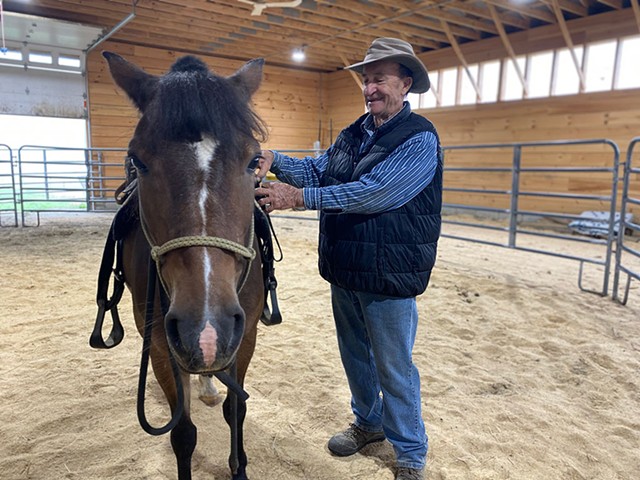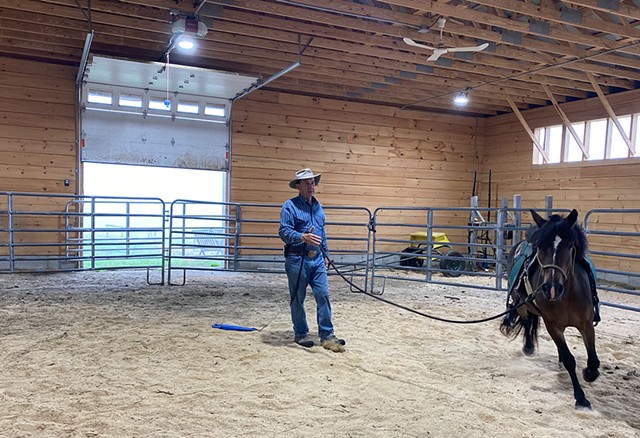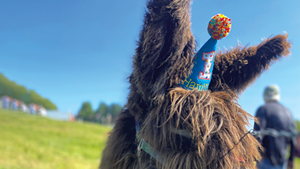
- Rachel Hellman ©️ Seven Days
- Gary Itzstein with Chessy
Neil watched intently as Gary Itzstein circled his 12-year-old chestnut mare, Chessy, in a delicate dance of trust. Itzstein carried a long pole with a blue flag tied to the end and moved it from Chessy's right side to her left, letting the flag gently tap the pony's belly. He aimed to make Chessy less sensitive to frightening situations.
The mare's ears ticked forward and back, and her eyes darted uneasily. Itzstein repeated the tapping exercise. And did so again. And again, for several more minutes. Chessy stomped her feet in frustration. Finally, she started making a chewing motion.
Itzstein's eyes lit up. "You see, she's digested that thought!" he exclaimed, in the accent of his native Australia. "When she chews, it means she's learning. If she doesn't chew, then there's going to be no progress."
Neil's eyebrows furrowed under his straw hat as he nodded slowly. This was important.
For Neil, it was the first lesson of many from the horse whisperer, who had come all the way from Aiken, S.C., to offer up his pony-placating talents to the Amish farmers of Brownington.
Itzstein stood in the center of a cavernous but brightly lit wooden barn that houses the Amish community's Saturday craft and food markets. A metal gate created a makeshift indoor training arena. The sound of rain echoed on the tin roof, making it sometimes difficult to hear what he was saying.

- Rachel Hellman ©️ Seven Days
- Gary Itzstein working with Chessy
Neil, a soft-spoken Amish farmer who relocated from Pennsylvania two years ago, watched Itzstein work with fascination, occasionally stroking his long beard. Neil, who asked to be identified only by first name, in keeping with the Amish ethos of humility, had purchased Chessy from a neighbor a year ago. But he had been too busy to properly train the horse. ("It was a good year on the farm," he would later explain.) Dressed in a blue cotton suit, Neil wanted Chessy to pull a plow and be ridden by his young children. But, as he put it: "She's a bit too sassy."
That's what led him to Itzstein, whose talents have turned him into a celebrity of sorts among Vermont's growing ranks of Amish. Since 2015, more than a dozen families have moved to Orleans County, mostly from Pennsylvania, in pursuit of fertile land at low prices.
The Amish seek to lead a simple life of faith, family and community. They eschew technology, embracing a literal interpretation of biblical commands. They have long preferred farming as a way of life and have a reputation as excellent craftspeople.
The group has become a fixture in Brownington, the site of the state's only Amish church settlement. Horses and buggies are as common as pickup trucks in the 1,000-person town. For the most part, the wider community has embraced the newcomers, frequenting their monthly benefit dinners, though some blame the Amish for saturating the local carpentry and agriculture markets and driving up competition.
Back in the makeshift arena, Itzstein began to move a rope gently over Chessy's head. He swung it under her belly and looped it back and forth on the dirt ground. He made a quiet "ch, ch" sound, gently petting the pony as he made his rounds.
"The horses were pretty rough on her," Neil told the trainer. "I got to the point where I was wondering if I should get her out of the pasture."
"Well, she'll be good in no time," Itzstein replied.
Itzstein seemed to follow a secret choreography; each of his movements was in careful response to the pony's. When Chessy turned, Itzstein waltzed with her, providing a better view of his jewel-encrusted belt and its buckle, which was engraved with a horse. His eyes twinkled as he circled Chessy, calling to her softly under his breath. At 70 years old, Itzstein is still nimble. He sported a mishmash of outdoor garb — safari-style hat, puffy vest, Western-style shirt and hiking boots — as well as an earnest smile that he flashed often at Neil as the day went on.
"We're both earning our dinner tonight," he said, laughing.
Itzstein was born and raised in Queensland, Australia, and comes from a line of horsemen. His father was a horse trainer, briefly, and so was his grandfather. Itzstein lived and worked in Okeechobee, Fla., for a period of time before relocating to Aiken, S.C. — a booming equestrian hot spot where he operates a training and breeding business called G'Day Mate Ranch.
It was in Okeechobee that Itzstein met Bari Fischer, co-owner of Arnold's Rescue Center, a nonprofit in Brownington that takes in farm animals and endangered donkeys. The two developed a strong connection around their mutual love of four-hooved animals. Last year, Itzstein agreed to come to Brownington to help train some of Fischer's donkeys.
The Amish quickly got word of Itzstein's talents. The next day, more than 15 horses were lined up along the road, waiting to be trained by Itzstein. The Australian had only planned to stay for a weekend, but he decided to extend his trip by almost two weeks. Unlike the high-end polo horses Itzstein trains in South Carolina, though, the animals in Brownington are used for more prosaic purposes, such as pulling buggies or plows.
Since returning to Vermont on August 30, Itzstein has been totally booked. He planned on staying for two weeks, offering sessions of a few hours each. He also brought along horse-care tools he planned to give the Amish: hoof picks, bits and lead lines.
Normally, Itzstein's trainings cost upwards of $700 a month. But, for a second year, he's offering his horse-whispering talents to the Brownington Amish free of charge. While he considers the free trainings a gift, they're also a favor to Fischer, who said the Amish community often pitches in at Arnold's Rescue.
Fischer sat in rapt observation of Chessy's training session. Sebago, her 2,100-pound Clydesdale-bred mule, was on deck for a much-needed appointment to get the animal used to human handling.
Itzstein's knowledge of horses is deep and broad. "The tough, hard ones, they're the best horses because you've got to work them," he told Neil. "You can't just give them sugar. Like David's little black horse. He's a tough one."
David, another Amish man from Brownington, had brought his stubborn equine to Itzstein the prior week. After only two hours of work, David was riding the little black horse home.
Neil agreed with Itzstein's assessment. "I have noticed that the tougher the horse is to train, the tougher he is," Neil said. "I've studied up on it. I read Monty Roberts' book."
Itzstein, a disciple of Roberts' teaching, grunted in approval as he petted Chessy. Roberts wrote the bestseller The Man Who Listens to Horses, a horse-whispering classic touting the importance of trust and the use of nonverbal language (which he terms "equus") to communicate with horses.
That, Itzstein explained, is what he was trying to build with Chessy through the exercises. By desensitizing the pony to various stimuli, Itzstein establishes himself as worthy of her trust.
"I'm getting her to be the foal, and I'm the mother," Itzstein explained. "I want her to latch on to me."
With that, Itzstein placed a saddle on Chessy. He beckoned the mare to follow. Chessy looked on uneasily. She began to turn in the opposite direction. Itzstein wanted the pony to track his movement, following him without the need for a verbal cue or tug of a rope — like a foal with its mother.
"Not quite yet," Neil observed. Itzstein persisted. He stood next to the pony and pressed down on the saddle, then began hopping up and down until Chessy appeared bored of the ruckus. Itzstein turned his shoulder and began walking to the right. This time, the mare followed confidently.
Itzstein smiled broadly. After three hours, Chessy had latched on.
To Neil, Fischer said: "You see? Your kids may soon have a ride to school."











Comments
Comments are closed.
From 2014-2020, Seven Days allowed readers to comment on all stories posted on our website. While we've appreciated the suggestions and insights, right now Seven Days is prioritizing our core mission — producing high-quality, responsible local journalism — over moderating online debates between readers.
To criticize, correct or praise our reporting, please send us a letter to the editor or send us a tip. We’ll check it out and report the results.
Online comments may return when we have better tech tools for managing them. Thanks for reading.